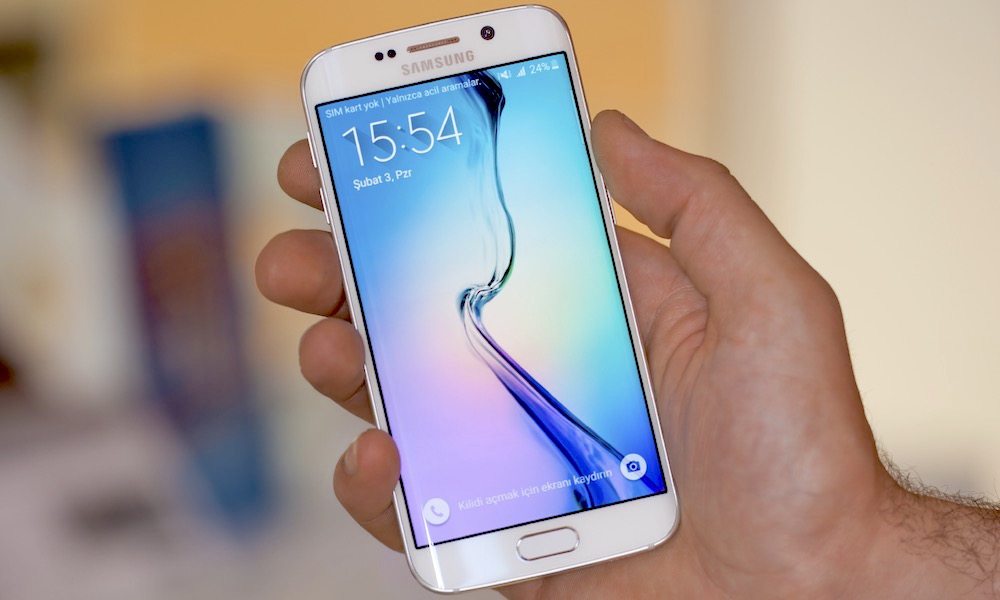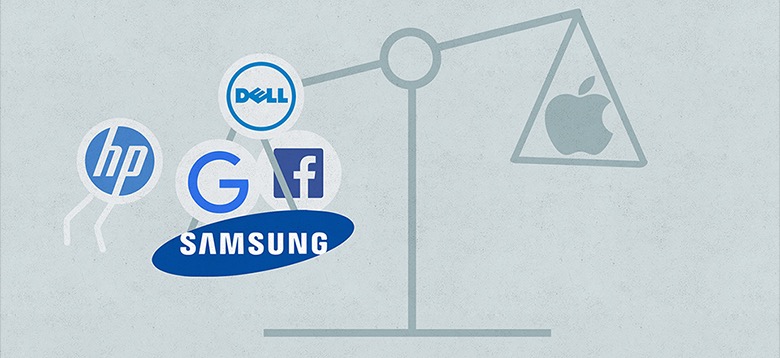Why More than Five Giant Technology Companies Are Ganging up on Apple

Toggle Dark Mode
Here’s a riddle for you: What do Facebook, Google, Dell, Hewlett Packard, and a handful of other big tech firms all have in common? (Hint: the answer doesn’t have anything to do with the fact that they’re all multi-billion dollar, publicly traded corporations.)
… Give up? Well, that’s alright friends, we’ll go ahead and spill the beans. What this consortium of tech-giants all have in common, is that they recently filed a joint statement with the United States Supreme Court, supporting Samsung in its ongoing legal proceedings with Apple, and shunning the Silicon Valley iPhone maker — arguing that the lower court’s decision in favor of Apple over Samsung is flawed and unsubstantiated.

Not only do these companies want the U.S. Supreme Court to hear Samsung’s appeals case against Apple, but they argue that the South Korean company shouldn’t have had to pay such a staggering and unprecedented fine in damages to Apple — even if the lower courts found Samsung to have infringed on “a few” of Apple’s design patents.
“Awarding a design patentee the total profit from an infringer’s product when the design covers only a relatively minor portion of the product is out of proportion with the significance of the design and out of touch with economic realities,” their brief reads, in part.
While the ongoing, and seemingly never-ending, dispute between Apple an Samsung has been unfolding like an early-afternoon soap opera since the former first brought claims to the table in 2011, it wasn’t until last December when Samsung ultimately decided to see if it could have the case heard by the U.S. Supreme Court — perhaps realizing that this game of cat and mouse could quite easily go on and on and if they didn’t receive an ultimate, indisputable ruling.
In case you don’t recall, Apple alleges that Samsung copied “several” elements of the iPhone’s hardware and software design. Although the patents in question are just as questionable, according to the companies backing Samsung’s appeal.
One has to do with the actual design of the handset, more specifically it’s “particular black rectangular round-cornered front face and surrounding bezel,” and the other has to do with the simple layout of “colorful icons in a grid pattern.”
“No one may own rectangles, round corners, the color black or the concept of a grid of icons,” Samsung said in its Supreme Court filing. The company’s original argument that the financial penalty should be limited to profits derived specifically from the infringed features was denied by the lower courts — cases that were primarily overheard by U.S. District Judge Lucy Koh.
In all, six individual “friend of the court” documents were submitted to the court on Friday — a collaborative effort carried out by several public advocacy groups, upwards of 37 intellectual property experts, and a tech-trade group in the U.S. They argued, on the whole, that an appeals court decision in regards to how damages should be determined is, at its core, anti-competitive; and, in all reality, excessive and unjustified.
“As applied to a modern, multicomponent product, the entire profit rule drastically overcompensates design patent owners, undervalues technological innovation and manufacturing know-how, and raises troubling questions about how to handle other potential claims to a share of the defendant’s profits.”
According to the Electronic Frontier Foundation, one of the advocacy groups who jointly filed documents with the court, “If the decision were allowed to stand, there would be a new precedent for abusive patent litigation. The decision could stifle startups from innovating.”
For its part, The U.S. Supreme Court hasn’t reviewed a case related to design patents in more than 120 years — according to Samsung’s court documents. It’s expected that the highest court in the land will decide whether or not to take the case within the first half of the year.
Surprisingly enough, Apple did not immediately respond to requests for comment on this recent development.
Learn More: Samsung to Steal 3D Touch Feature for Galaxy S7
What do you think about all these Apple vs. Samsung proceedings?






